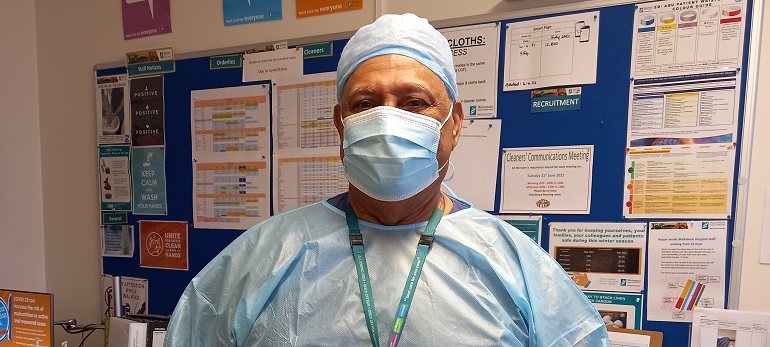Ageing workforce
Tāmaki Makaurau has the largest population of people aged 65 and older in Aotearoa New Zealand, and while most older people are doing well financially, many will face hardship in the future.
On this page

Photo: Waitematā District Health Board
“Working gives me pleasure and an opportunity to share my knowledge and experience with others new to working in the health sector.”
Gaseata Fred Ulugia – 76 year old health professional
Underutilisation of older workers is an ongoing issue, especially in Tāmaki Makaurau, with 12% of its population aged 65 in 2018, growing to 18% in 2043. COVID-19 has deepened this issue with workers taking longer to re-engage with the labour market or enduring poorer conditions on re-employment.
People are living longer which means they are continuing to learn and be productive. Advances in research and technology drive innovation in virtually every field that affects the ability to live well as people age.
Statistics New Zealand, in its national projections released in December 2020, highlighted that the number of people aged 65+ doubled between 1991 and 2020, reaching 790,000. This is projected to double by 2056. The most significant growth will occur between 2011 and 2038 as the baby boomers move into the 65+ age group. This has a substantial impact on the region’s ageing workforce. The Tāmaki Makaurau tauawhi kaumatua Age-friendly Auckland Action Plan, produced by Auckland Council, highlights that the region has about a fifth of its ageing workforce above 65 in full-time or part-time paid employment. These figures are forecast to increase significantly by 2043.
In Aotearoa New Zealand, employers are freezing the over 50s out of the jobs market. Working past the age of 65 in Tāmaki Makaurau is a common need, and older workers have a skill bank that can be used immediately. Most of the people in this group are actively looking for work and are healthy, with nearly 72% of 60-65-year-olds already working at least 1 hour a week.
Tāmaki Makaurau Tauawhi Kaumātua – Age-friendly Auckland Action Plan [PDF, 8.41 MB](external link) — Auckland Council
How employers are freezing the over 50s out of the job market(external link) — Stuff.co.nz
Key labour market and workforce insights
- The region scores poorly on lifelong career development services for mature workers and the ageing workforce who are vulnerable to technology change.
- The Office for Seniors (MSD), has highlighted the issues of an ageing population and recently released its strategic plan "Better Later Life – He Oranga Kaumātua 2019 to 2034", underscoring that older people have the ability and are keen to work. Those who cannot due to health issues or disability are still supported by employers.
- Older workers have highlighted challenges in getting information about flexible and supportive work practices that may suit their needs to ensure active participation in the workforce.
- Workplaces need to provide flexible work opportunities and learning and development opportunities, incorporating a whole-of-life and whānau-centred approach for older workers in their continuity plans.
- Employers have not embraced older workers as an asset, but rather see them as a liability. Repeated surveys by Employers and Manufacturers Association (EMA) and the Commission for Financial Capability show that around 24% of employers are considering the ageing workforce as key employees, while others are doing nothing or not intending to do anything.
- In 2010, there were just over 5 working people for every retiree, and in 2060 this is predicted to be just over 2 working people. This has significant impacts on tax revenue against social spending.
Better Later Life – He Oranga Kaumātua 2019 to 2034(external link) — Office for Seniors
Employers and Manufacturers Association(external link)
Financial Capability Research(external link) — Retirement Commission Te Ara Ahunga Ora
Enabling participation of ageing workforce actions
- The RSLG advocates for initiatives that maintain employability of older workers in the region’s workforce.
- The RSLG supports regional initiatives that will change the mindsets of employers to embrace older workers as an asset rather than a liability.
- The RSLG promotes supporting and protecting the welfare and wellbeing of older people in the workplace across Tāmaki Makaurau.
- The RSLG will review the recommendations from the recently released Older Workers Employment Action Plan and incorporate these, where appropriate, into the ongoing work of the RSLG.
Older Workers Action Plan [PDF, 926 MB](external link) — Office for Seniors

